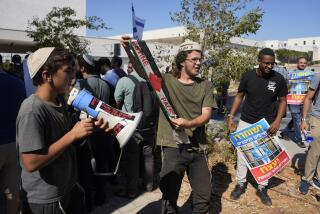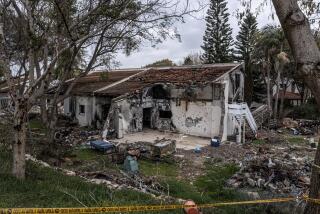Israeli Team to Probe Killing of Palestinians
- Share via
JERUSALEM — Prime Minister Yitzhak Shamir named a special investigative team Wednesday to look into the police shooting of 19 Palestinians in Jerusalem’s Old City, and Israeli officials said no United Nations inquiry is needed into what they regard as an internal matter.
The appointment of the investigative team, to be headed by a former chief of the Mossad, Israel’s intelligence service, came as Israel awaited a vote in the U.N. Security Council on a proposal to condemn the killings.
Israeli officials have indicated that, as in the past, they would accept envoys of U.N. Secretary General Javier Perez de Cuellar--but not a group that answers to the Security Council, which could order action based on its recommendations.
In any event, Israeli officials made it clear that any outside investigation is undesirable.
“It will now be investigated by ourselves,” Yossi Ahimeir, a spokesman for Shamir, told reporters. “We don’t need a probe by international factors.”
Ahimeir also said: “We hope our position will be understood. We reacted against provocation that was planned against Jewish worshipers. The marginal point of whether it was excessive force or not is to be investigated.”
At stake in the U.N. action, according to Israeli and Palestinian observers, is the perception of who controls the Israeli-occupied West Bank and Gaza Strip as well as the Arab districts of Jerusalem. Israel has annexed the Jerusalem districts, which were seized in the 1967 Arab-Israeli War.
Israel maintains that it alone is responsible for security in the occupied territories, and admission of a U.N. team would imply a competing authority. The Shamir government argues that any settlement of the Israeli-Palestinian conflict must be preceded by direct talks with hostile Arab states.
Sensing a move to force Israel to compromise on its claim to the West Bank and the Gaza Strip, Shamir vowed to hold on to the territory, saying:
“This is our country. This is our land. And no force in the world will change this eternal fact.”
As the Palestinians see it, U.N. intervention in even an indirect way would support their claim to a Palestinian state in the West Bank and Gaza, along with half of Jerusalem, without their having to deal directly with Israel. The Palestine Liberation Organization has been pressing the United Nations for several years to send military forces to replace the Israeli army in the territories.
“It’s a question of principle,” Arab affairs expert Asher Susser said. “Who is in control of the territories? Once Israel accedes to U.N. observer status, it takes a step toward perhaps accepting a U.N. mandate over the area. Israeli control would be reduced without negotiations. That’s what the Palestinians want to happen and what Israel wants to prevent.”
The incident under discussion in the Security Council occurred Monday at the Temple Mount, a site holy to Jews and Muslims alike. The Dome of the Rock and Al Aqsa mosque, major Muslim shrines, stand in the area, the site of a Jewish temple in biblical times.
The Palestinians rained stones on worshipers at the Western Wall, the Jews’ most sacred prayer site, and Israeli police retaliated with tear gas and gunfire. The death toll was the highest for a single day in the 34 months since the start of the Arab uprising against Israeli rule. Dozens of foreign governments, including the United States, have criticized Israel for using what they have called excessive violence.
The three-member commission named by Shamir replaces a panel appointed by Police Commissioner Yaacov Turner, who is under fire for allegedly ignoring signs of impending trouble on the Temple Mount, according to Israeli newspapers. Arabs had gathered at the site to confront a reported effort by Jewish fundamentalists to enter the compound and lay a cornerstone for a new temple.
Zvi Zamir, director of Mossad from 1968 to 1974, will head the commission. The other members are Yaacov Neeman, a partner in the law firm of President Chaim Herzog, and Chaim Kubersky, a former official in the Interior Ministry.
According to Israel Radio, the commission will have no authority to force witnesses to testify under oath, and its recommendations will not be binding. It will look into the behavior of the Palestinians, the police reaction and the matter of police preparedness, then report to the prime minster.
The appointment of special investigators is nothing new in Israel. The procedure was used to investigate the army’s role in the massacre of Palestinians in Lebanon by an allied Christian militia force in 1982, and the deaths of two Palestinian terrorist suspects at the hands of Shin Bet, the domestic intelligence agency, in 1985.
“Israel has a pretty good track record of investigating itself,” said Harry Wall, who heads the Anti-Defamation League office in Jerusalem. Wall argued that a U.N. investigation would be less reliable and that its results would be rejected by the Israeli people.
Reports in the Israeli press suggest that the police failed to act on intelligence reports. The newspaper Maariv reported that police officers panicked at rumors that some of their colleagues were trapped in a police station that had been set on fire by the rioters.
“The (gunfire) was not done in planned fashion or by command, but rather independently, based on decisions by isolated policemen or a small force when they felt their lives were endangered,” Maariv said.
It reported that Shin Bet, the security agency, says it warned police that a riot was likely but that police deny getting such a warning.
The newspaper Haaretz reported that information gathered by investigators so far suggests that the Temple Mount protest was not planned ahead of time, as some Israeli politicians and commentators have charged.
Jerusalem Mayor Teddy Kollek said the police showed a “lack of forethought” by not reinforcing units around the Temple Mount. The opposition Labor Party issued a statement accusing Shamir’s government of “a laxness in security that endangered the lives of Jews” worshiping at the Western Wall.
Meanwhile, a court in Jerusalem extended the detention of two Palestinians suspected of inciting the riot. Faisal Husseini, an activist associated with the PLO, and Sheik Mohammed Jamal, a cleric at the Al Aqsa mosque, were ordered held for 10 days pending investigation.
More to Read
Sign up for Essential California
The most important California stories and recommendations in your inbox every morning.
You may occasionally receive promotional content from the Los Angeles Times.










